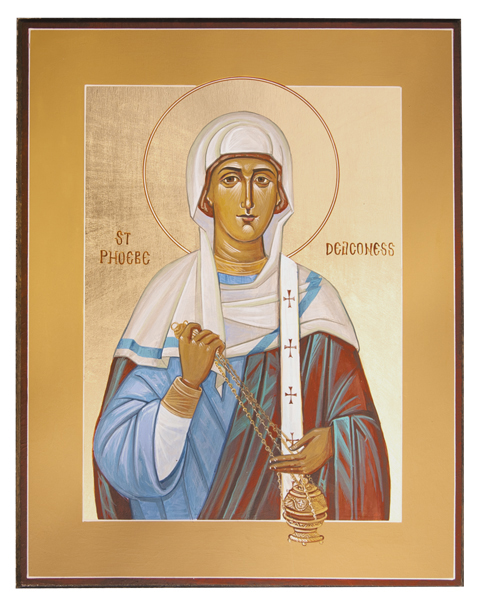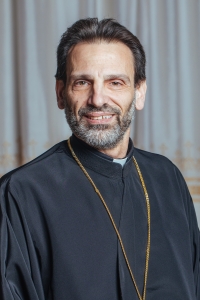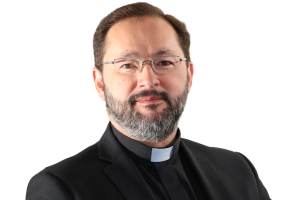About St. Phoebe the Deaconess
St. Phoebe is recognized as the first woman deacon, although we know little about her life. She is honored as being the prototype for female deacons just as St. Stephen is the prototype for male deacons. In her book Women Deacons in the Orthodox Church [See book review in this issue.], Dr. Kyriaki FitzGerald suggests that St. Phoebe is an example of faith and service for female deacons.
St. Phoebe came from a very busy port area called Cenchreae, a popular stop for people traveling from Syria or Asia Minor. Although there has been a great amount of debate concerning what her actual duties as a deacon might have been, it is clear that St. Paul gave recognition to St. Phoebe, thanking her in public for her hospitality and for meeting the needs of the people in Cenchreae, and urging others to help her with her ministry as “a deaconess of the Church at Cenchreae.”
Centuries later, St. John Chrysostom praised St. Phoebe’s work for the Church as an inspiration and model for both men and women to imitate. He calls her a saint – a holy person and a woman who served the Church through the office of deacon.
Women were indeed called to serve in the early Church, as is seen in the example of St. Phoebe. It was an honor to be able to give such service to the community through charitable acts and dedication to the church community. There are many women in addition to St. Phoebe who are recognized by the Church for their various ministries – St. Poplia (fourth century), St. Sophia, known as the “second Phoebe” (fifth century), St. Tabitha, mentioned in the early Acts of the Apostles, also known for her almsgiving, St. Mary, St. Mark’s mother who opened her house for Christian meetings in Jerusalem, St. Lydia, who showed her hospitality to St. Paul and his companions, and St. Priscilla, who was involved in missionary work (FitzGerald 1998). Female deacons are mentioned in the salutations of the epistle to the Philippians (1:1), and the first epistle to Timothy (3:8,12).
Since the beginning of the Church, women have been using their talents and gifts from God to serve. I hope and pray that the Church will find some way to embrace these talents and gifts and restore the office of the female diaconate.
by Maria Khoury
Originally published in the St. Nina Quarterly
Commemorated September 3
TROPARION to St. Phoebe
Slavic Musical Notation for Troparion, with gratitude to Dr. Katya Ermolaeva
Byzantine Musical Notation for Apolytikion (Troparion), with gratitude to Patrick Haddad
Enlightened by grace and taught the Faith by the Chosen vessel of Christ,You were found worthy of the diaconate; And you carried Paul’s words to Rome.O Deaconess Phoebe, pray to Christ God That his Spirit may enlighten our souls!
KONTAKION to St. Phoebe
Slavic Musical Notation for Kontakion, with gratitude to Dr. Katya Ermolaeva
Byzantine Musical Notation for Kontakion, with gratitude to Patrick Haddad
Paul proclaimed you a protector of many/ and you did become his helper./ Hearken to those who approach you with faith/ and who cry out to you with love/ Rejoice glory of Corinth and pride of Achaia;/ rejoice you lamp of Cenchrea,/ rejoice, O Deaconess Phoebe.



































